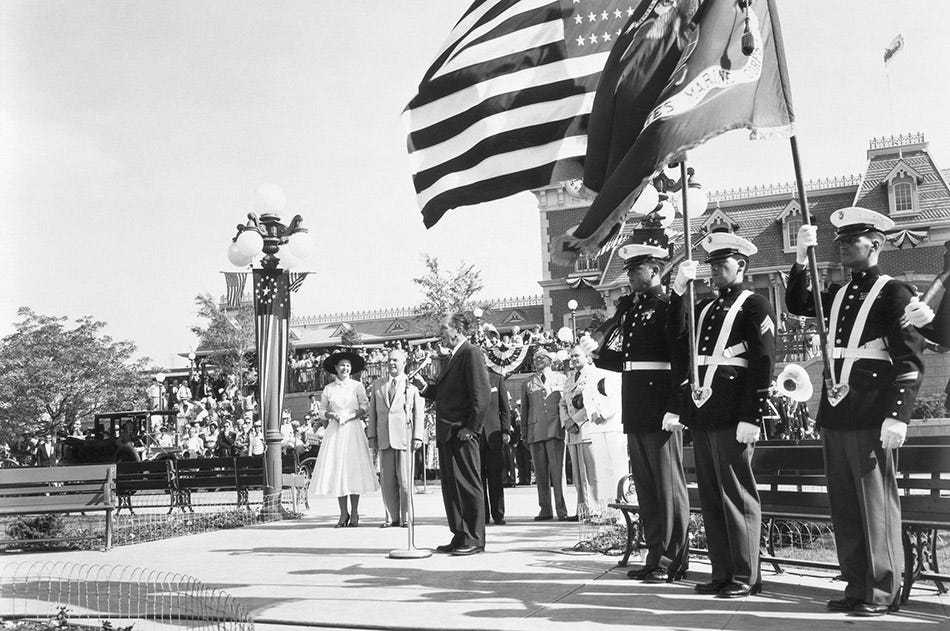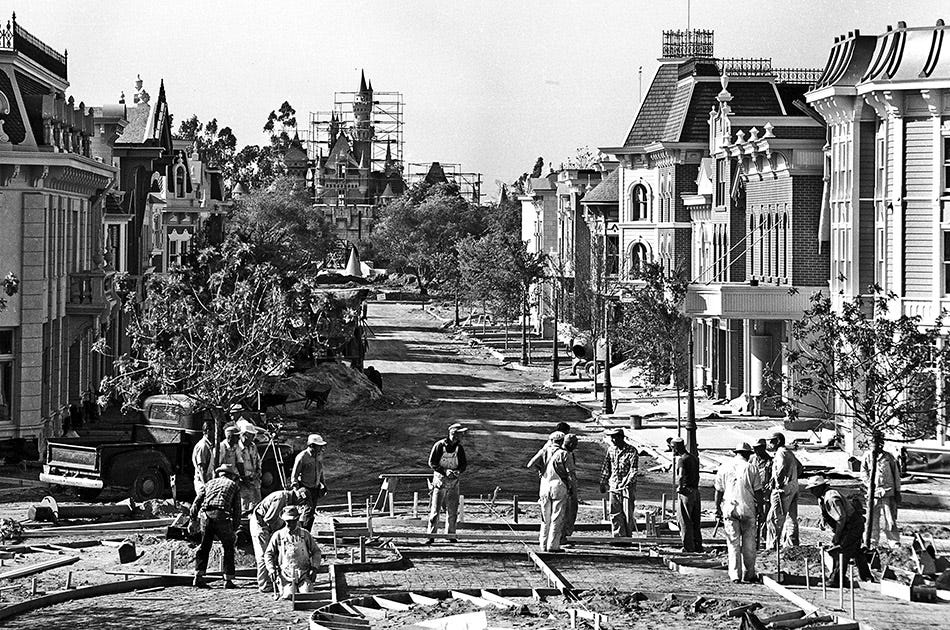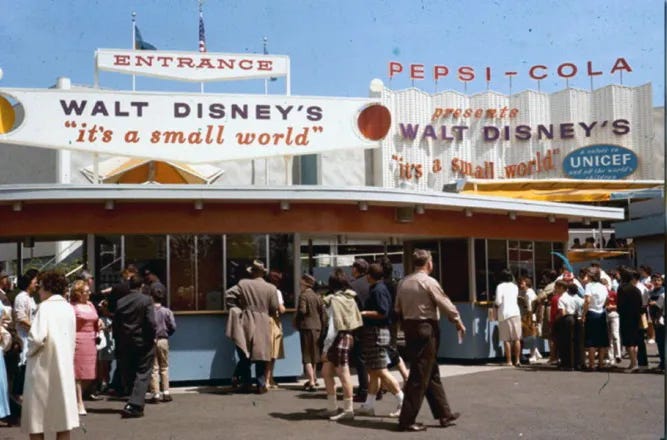Reflecting on Disney at 100
At the century mark, the media company’s considerable impact is undeniable
The Disney100 Years of Wonder celebration, which will mark the 100th anniversary of The Walt Disney Company, is set to kick off this Friday at Disneyland (and I’ll be there to report about the event for About Theme Parks). It is therefore an opportune time to contemplate the company’s legacy and its outsized influence. What does Disney mean to the world? What does it mean to me?
Joining me in this tribute is my colleague, Robert Niles of Theme Park Insider. He has his own take on the legendary company. As a former Disney Parks cast member, Robert has a special connection that informs his perspective. Please consider reading his Disney100 story. We will both comment on each other’s articles.
Paid subscribers can hear my audio narration of this article in this month’s ART Talks. Wait, what’s that? You’re not a paid subscriber? Well, kindly consider becoming one.
Imagine a world without Disney.
No Mrs. Jumbo tenderly caressing a crying Dumbo to the mournful tune, “Baby Mine.” No Queen Elsa belting out “Let It Go.” No fireworks exploding above Sleeping Beauty Castle. No Mickey Mouse.
It seems inconceivable.
The Walt Disney Company, like few other organizations–and perhaps more than any other one–is inextricably woven into the fabric of our culture. Virtually every child, almost from infancy, is introduced to the cheerfully optimistic mouse and, over time, many of the company’s other characters, and develops a lifelong attachment to them. It evolves into a shorthand, a familiarity, a wistfulness that exerts a powerful hold on us even as we move into jaded adulthood. Then we have our own children, and the cycle begins anew.
It’s not just the characters that enter our collective conscious, but the very essence of the company. There is something manifestly “Disney” that we instinctively recognize and that calls out to us. Catching a snippet, however brief, of an old movie will instantly return us to our childhood, to a time of innocence. Entering a Disney park–despite the maddening reservations, the amount of money we have to dish out, the Genie gyrations we have to go through, the need to be tethered to our devices, and all the other exasperating hassles–still feels like a homecoming (even without relentlessly enthusiastic cast members exclaiming, “Welcome home!” as they are wont to do). The parks offer a reassuring sense of place and a sense of having arrived.
Unabashedly American
The ubiquity of Disney can sometimes strain the otherwise indelible, special relationship we have with the company. It’s the American way to brand and commodify everything. Seeing a Mickey Mouse-emblazoned sticker slapped onto a bunch of bananas, however, can be off-putting–even as it has its desired effect. Mickey and his overseers don’t have anything to do with the quality of the fruit of course, yet his visage just may influence our purchasing behavior at the supermarket.
It’s hard, sometimes, to reconcile that Disney is, in fact, a business steeped in the American way. It can feel more like an old friend or a welcome refuge. Partly, that’s because of the man for whom the company is named. Although he has been gone for many years, Walt Disney remains the organization’s heart and soul–especially for people of a certain age (including me). He is like a kindly, fascinating, and endlessly fun relative whom we adored, and the characters, the movies, and the parks that are his legacy are fond reminders of him.
But Disney is one of the largest media companies in the world and makes gazillions of dollars for its shareholders. During its ascent, it has gobbled up, for better or worse, Pixar, Hulu, Lucasfilm, Marvel, and 21st Century Fox, just to name a few acquisitions. The company operates ESPN, ABC, Disney+, and more. That’s a formidable portfolio. When I say that Disney wields enormous influence, however, I’m not just talking about its holdings and its balance sheet. I’m referring more to the deep, personal connections it has nurtured for generations and its considerable emotional pull. Those attributes transcend and arguably hold greater currency than market capitalization.
Disney is unabashedly American. It pledges allegiance to an aspirational United States. And it is a flag-waving emissary, exporting its rendition of America across the globe. It’s fairly astonishing that people in Tokyo, Hong Kong, and, of all places, Paris gleefully stroll down Main Street, U.S.A. in all its picture-perfect, red, white, and blue glory. (But alas, not in mainland China where guests enter Shanghai Disneyland along Mickey Avenue.)
A singular vision
During its 100 years, Disney has logged many incredible, impactful accomplishments. In its early years, the animation studio perfected sound synchronization for the groundbreaking Steamboat Willie, the short that helped make Mickey Mouse a household name. In the 1930s, it created the multiplane camera, which added a sense of depth and realism to animation. But Disney’s most important early development was 1937’s Snow White, which was the first feature-length animated film. It demonstrated that audiences of all ages could not only accept the concept of and commit to a long-form movie, but also invest in its hand-drawn characters and their story. It elevated animation to an art form and broadened the cinematic palette.

What began as a dad sitting on a park bench, frustrated that he couldn’t enjoy traditional amusement rides with his children, evolved, through sheer force of will, into Disneyland. With a singular vision and an abiding sense of purpose, Walt Disney created a different kind of amusement park. It incorporated many of the storytelling and moviemaking techniques with which he and his team were familiar. Disneyland is the archetype of what we now think of as a “theme park.”
Let’s face it: Without Walt Disney, there likely wouldn’t be any theme parks. Disneyland spawned an entire industry of parks and attractions that has become a worldwide phenomenon. The sprawling Walt Disney World, with its multiple parks, many hotels, and other amenities, pioneered the notion of the theme park destination resort. More than that, it has challenged, and in some ways altered, the very idea of what it means to go on vacation.
Disney’s impact is also readily evident in today’s more engaging and story-savvy museums, aquariums, visitor centers, zoos, and other park-adjacent places. But the company’s reach is so much more than that. Architects, urban planners, restaurateurs, retailers, hotel designers, and many others borrow liberally from and are heavily influenced by the Disney parks playbook of themed lands and story-driven attractions.
Fairly flabbergasted
As you might expect, Disney has had a tremendous impact on my life. It began at a very young age. My grandparents took me to my first movie, Pinocchio, when I was about four years old. (Yes I’m old, but I’m not so old that I was there for the film’s original 1940 debut. I saw a re-release in the early 1960s.) Sitting in the darkened theater, I was transfixed by the charming, heartwarming, and sometimes frightening, film. I hummed “When You Wish Upon a Star” and “Hi-Diddle-Dee-Dee (An Actor’s Life For Me)” for days after and begged to go back to see it again.
I never missed an episode of “Walt Disney’s Wonderful World of Color” (which, for many years, I had to watch in wonderful black-and-white) and was enraptured each Sunday evening as Walt introduced his television program–especially when it was about the faraway, magical place, Disneyland. The first book I took out of the library, proudly using my own library card, was a biography of Walt Disney that was written for children.
When I was in grade school, the first big trip my family took me on was to New York City and to the 1964-65 New York World’s Fair. I was fairly flabbergasted by what I encountered. I just couldn’t believe the four attractions that Disney premiered at the fair: “it’s a small world,” the Carousel of Progress, Great Moments with Mr. Lincoln, and Ford’s Magic Skyway. It was heady, jaw-dropping stuff for a kid in the second grade. (Really, it was heady stuff for all fairgoers; the exhibits were enormously popular.)
A few years later, we (finally) made the pilgrimage to Disneyland, and I was dumbfounded anew. Pirates of the Caribbean! Haunted Mansion! Adventure Thru Inner Space! Sure, virtually all kids love Disneyland. But I took it to the next, decidedly nerdy level. I actually wrote to Walt Disney Productions, breathlessly recounted my visit to the park, proclaimed my adoration, and said that I was hoping to learn more about Walt Disney World, which was scheduled to open in a few months. Perhaps it was the budding journalist in me, seeking information. Imagine my delight when I received a hefty package of promotional materials along with a lovely, personalized, typewritten letter on Disneyland letterhead. I’ve treasured it ever since.
So yeah, I’m a full-blown Disney geek. It took me awhile, but I eventually figured out a way to channel my passion for the Disney parks, and for parks and attractions in general, into the crazy career I’ve cobbled together. 31 years into my journey as a theme parks journalist it has been, and still is, one heckuva ride. I owe a debt of gratitude to the Walt Disney Company for helping to set me on this path and for continuing to conjure parks, lands, and attractions that flabbergast me. Really, I owe an enormous debt of gratitude to Walt Disney and his early Imagineers for creating Disneyland in the first place. And, I dare say, all theme park fans owe them a tip of the hat.
Finally, I owe a debt of gratitude to Disney for leading me here, to About Theme Parks, where I get to share my adventures and my musings with you. And where we get to share our mutual passion for parks and attractions. As the company embarks on its second century, I look forward to discovering what new surprises it has in store and bringing the news to you.







No media company has built a brand name like Disney, and no media company has become as synonymous with America as Disney. I am proud to be a former cast member, and while the company definitely still faces real challenges, I am happy to collaborate on this tribute to Disney with you.
Nice! There is definitely a special something about the Disney parks. I've never been able to quite say what it is. But this story is helping me understand it better.